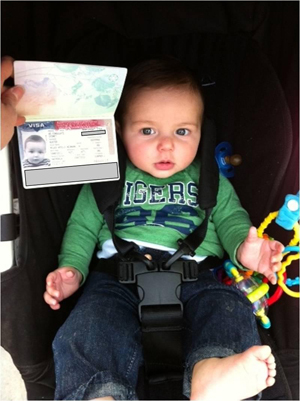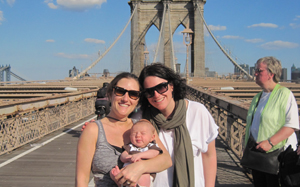The below story is copied from the Huffington Post blog. It appears the immigration attorney in this case was not available to make comments but I can only imagine this case was legally complex and challenging. This is a great win for same-sex immigration laws and I hope it will have profound effects going forward. I applaud the attorney who conducted the case and the embassy in Australia for taking a pragmatic approach in this case. It will hopefully set precedent for others in similar situations. – Tahmina
A Baby to Change the Times… and U.S. Immigration Laws
Adrian Margaret Brune, Freelance Writer, The Nation
Though he last entered the U.S. as an Australian citizen only, when Miles Apollo Neumann Auster returns to the States again, he will become the first dual-citizen child of a multinational gay couple.
That is, if the stars align, the money comes through for a plane ticket and the baby makes it to the States right around his first birthday. Technically born to a lesbian and her partner in Melbourne six months ago, when Miles entered the world, he had two moms listed on his birth certificate — both his Aussie mom and his American one. Miles’ parents hoped with this small feat in Australia, which changed its parental rights laws last year, the U.S. government would grant their son his U.S. citizenship automatically, as it would to any other child born abroad to at least one American parent.
 It didn’t. Then push came to shove when the younger brother of his American mother, Rachael Neumann, died tragically in late September. The U.S. still hadn’t come back with a decision on the case yet. Nonetheless, tourist visas were procured, tickets were booked and a funeral was attended.
It didn’t. Then push came to shove when the younger brother of his American mother, Rachael Neumann, died tragically in late September. The U.S. still hadn’t come back with a decision on the case yet. Nonetheless, tourist visas were procured, tickets were booked and a funeral was attended.
Only when Neumann and her son returned after 10 days in New York did they discover that good news followed tragedy, and Miles would indeed become an American citizen the next time a U.S. customs agent stamps his visa. However, exhausted of their savings for the 24-hour flight, which cost upwards of $5,000, Neumann and Jodie Auster — Miles’ Australian birth mother — are not quite sure that day will come before the April 12 deadline.
“Part of me wishes this had gone through earlier, and it’s bittersweet — it was hard to land in Australia and then be told you have to return to the U.S. as soon as possible,” Neumann said in an email from Australia. “But we’re grateful for the power of one person to stand up for what’s right, and potentially help change the course of history.”
This is the convoluted, complicated — at times dramatic, at times heart-wrenching — story of multinational children of LGBT parents and their struggle to gain citizenship for their children. This one has a happy ending — and potentially huge implications for other LGBT parents abroad — but it also further illustrates the expense and frustration expended by gay couples for outdated laws that do not reflect the changing nature of today’s families.
The Beginning of the Journey
Rachael Neumann, a management consultant and social entrepreneur from Long Island, met Jodie Auster, a doctor from Down Under, while both earning their MBAs at Columbia Business School and NYU’s Stern School of Business New York. Months after graduation, Neumann had moved to Australia, and the two set about having children. Miles entered their lives within two years of settling down in Melbourne.
Knowing they might want to live in the States again one day — or give their son the right to live, study and work without a visa here — the couple began to petition the U.S. Consulate in Melbourne practically before the ink on the birth certificate had dried.
“We debated where to have him born, actually,” Neumann said. “I wanted him born in the U.S., but then we decided to do it in Australia because the government had changed the law and would list me as his legal parent.
“I figured that parental right was worth more than anything.” Neumann was under the impression that upon Miles’ birth, he would receive a U.S. Birth Abroad certificate, which entitles a child of an American parent a U.S. birth certificate, passport and Social Security number just for showing up at the consulate.
But, despite Australia’s laws and Neumann’s designation on the hospital birth certificate, the consulate denied the U.S. birthright. “Up until then, I usually forget we’re different — we’re loving parents; we bought a new house for our family; we felt like everyone else,” Neumann said. “The term ‘second-class citizen’ resonated with me for the very first time — it was a very rude reminder of the laws back home.”
Homeward Bound: Trip One
Instead of giving a hearty “fuck you” to America — “that should be Miles’ decision, not ours,” Neumann said — last summer, Auster and Neumann loaded up Miles and flew to the States to meet his American family. While home, Miles’ mothers sought legal counsel for an immigration visa but were told a pathway for them didn’t exist; because legal parents didn’t have to sponsor their child for a visa, U.S. immigration doesn’t have the protocol. The couple also looked into adoption, for Neumann and Auster, the birth mother, but was denied again because both lived abroad.
 While on Long Island, Miles met his uncle, Jacob Neumann, a 21-year-old, popular senior at Arizona State University, the youngest in a close-knit clan of four siblings and himself a campus entrepreneur. Miles never saw his uncle again.
While on Long Island, Miles met his uncle, Jacob Neumann, a 21-year-old, popular senior at Arizona State University, the youngest in a close-knit clan of four siblings and himself a campus entrepreneur. Miles never saw his uncle again.
Homeward Bound: Trip Two
Months later, Neumann received an email from the Immigration Visa department of the U.S. Consulate in Sydney, Australia. Apparently, unbeknownst to Auster and Neumann, a consular agent, Tiffany Johnson, had seen their request (and subsequent denial), realized the discrepancy between the laws, as well as the discrimination, and petitioned the U.S. State Department to reconsider. The U.S. Consulate in Sydney banded together its legal team and found a loophole based on surrogacy parenthood in India. In visa cases “involving reproductive technology” the email stated, “(the United States) will recognized as a birth parent whomever the law in the place of birth says are the birth parents.”
Then, on September 28, Jacob Neumann was killed in a motorcycle accident in Arizona. Four hours after receiving the news, Auster, Neumann and Miles were on a plane to New York. “The day before Jacob died, he Skyped with Miles for 40 minutes. I just put the camera on Miles and Jacob just watched him roll and play — he loved him.
“The last thing I said to Jacob, before we hung up was, ‘One question: is your nephew the cutest baby in the world?’ and he replied, ‘Absa-freakin-lutely.'”
The day after returning to Australia, Neumann took Miles for his final interview for his U.S. Immigration Visa.
“I met her (Johnson) for the first time, and she said, ‘I don’t really have any questions for you — I’ve been working on your case for months. I know everything about it,'” Neumann said. “She said it was great to meet the little guy after working on the case so long.
“As I was paying the second processing fee, I asked her, ‘So is this really going to work?’ I still didn’t quite believe it. She looked at me and, in a steady hopeful voice, said, “Yeah… I really do think it’s going to work. Our lawyers said, ‘We did it.'”
As far as the implications for other LGBT ex-pat families — or even whether they would consider the loophole before it likely closes — Neumann can’t comment. Her U.S. immigration attorney was unavailable at press time. Right now, she and Auster are simply focused on getting Miles to the U.S. to obtain his citizenship and U.S. Passport (they will likely use more savings for the trip) and have appealed to producers at The Ellen DeGeneres Show to get the word out about not only the clause, but also the incredible moxie of the consular official.
“It’s a seminal moment for our family and families everywhere seeking out equal rights and protection under the law,” Neumann said. “But this milestone is not the result of legal battles or law change. Rather, it is the result of one person to recognize injustice and do everything possible to correct it.”
